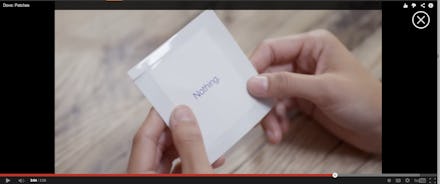Turning Feminism Into Marketing Has a Serious Downside

The latest in a slew of trendy, female-focused "real beauty" ads is Dove's "Patches," in which women with low self-esteem are tricked into thinking a prescribed beauty patch is making them more confident when — spoiler alert! — there's nothing in the patch. The confidence was there inside them all along.
This $4 billion corporation is just one of many latching onto the latest "trend" of female empowerment. Just look to American Eagle's "Aerie Real" marketing campaign, Pantene's "Shine Strong" video and every Dove campaign from the last 10 years. Beyond marketers, media in general is glomming onto these concepts of "real" beauty, "real" bodies and feminism, pegging them as newsworthy trends.
Image Credit: Huffington Post
Today Show hosts devoted an episode to the no-makeup trend as part of their "Love Your Selfie" campaign; ABC News covered a bride who chose to not wear makeup on her wedding day; #nomakeupselfies raised money for cancer (albeit in a kind of pointless and totally confusing manner); and the latest runway style features nude or barely-there makeup. Celebrities, too, are getting in on the action. The May cover of W magazine features actress Rosamund Pike taking off her makeup, and A-listers like Scarlett Johansson and Kate Winslet went makeup-less for the 20th annual Vanity Fair Hollywood edition. And it nearly goes without saying that Beyoncé's self-titled album spurred a nationwide discussion about feminism and what it means to be a modern woman. Self-proclaimed feminist singer Lorde tweeted a "real" picture of herself to protest Photoshop and remind fans that "flaws are OK."
Advocating for women to accept themselves as they are is a noble endeavor, and one that's finally more socially acceptable than ever before. But why are we labeling these ideas as trends? The feminist movement has been around for hundreds of years. There are women who have always believed in celebrating their natural selves, just as there have always been women who don't wear makeup, who embrace their bodies and who believe they're beautiful (or who don't care whether anyone thinks they're beautiful). What's really happening here is a clever and dangerous sham: The beauty industry is keeping the status quo while pretending to upend it.
As we break down gender norms and as the social and political climates begin to lean more toward equality and women's rights, our culture is moving to a place where women are #notbuyingit and subscribing less and less to the beauty myth. That place is a terrifying one for marketers. If the beauty industry loses its power over consumers and can no longer create "problems" for which it can provide solutions, it's out of business. Unless, that is, marketers can convince us they're on board with this cultural shift. So the beauty industry has turned things women have done forever into trends in order to capitalize on them, essentially saying, "We get it: You're 'real.' Real women buy [insert thing you don't need here]."
As Jezebel writer Callie Beusman puts it, for women, calling the no-makeup look "a trend is a big extrapolation. When magazines feature celebrities without makeup, it's a statement because makeup is the industry norm; that statement gets people talking (as we are, now) and sells copies. It's the same sort of thing when celebrities take 'no makeup selfies' — because we expect our idols to appear perfectly coiffed and polished, it's somehow significant when they aren't ... [But] we can't really say that something's a trend for the everywoman if the everywoman has already been doing it without much thought."
The same goes for feminism and selling products under the guise of empowerment. It allows marketers or movie, music and TV companies to undermine women's agency in the name of trends. By convincing consumers that they're helping empower women through helping them embrace their "true beauty," companies like Dove garner good will for their brand by seeming progressive. But don't be fooled: Dove, Pantene, American Eagle and the like are first and foremost concerned with their bottom line. Underneath these messages remains a product, one that preys on low self-esteem and operates under the assumption that women might be beautiful the "real" way they are, but not so beautiful that they won't continue to need beauty products or colorful undies or diet cereal.
Calling them trends is dangerous in and of itself: The very act implies they have no staying power — that feminism may be popular right now, but at some point it won't be, and that it's acceptable to embrace your natural body, but only until we ride this fad out.
It's important to acknowledge that even if marketers are ultimately concerned with sales numbers, at least they're moving in a forward direction with campaigns that present and celebrate a more progressive view of women. But societally, we'd be remiss to not keep in mind that it's being done upon a premise of "trendiness" — a premise that undermines women's agency and that has a shelf life.
Thankfully, Dove's latest "Patches" ad has already inspired a spot-on parody video that we can only hope is indicative that consumers really are #notbuyingit.